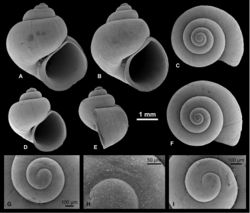Abeskunus brusinianus
| Notice: | This page is derived from the original publication listed below, whose author(s) should always be credited. Further contributors may edit and improve the content of this page and, consequently, need to be credited as well (see page history). Any assessment of factual correctness requires a careful review of the original article as well as of subsequent contributions.
If you are uncertain whether your planned contribution is correct or not, we suggest that you use the associated discussion page instead of editing the page directly. This page should be cited as follows (rationale):
Citation formats to copy and paste
BibTeX: @article{Neubauer2018ZooKeys, RIS/ Endnote: TY - JOUR Wikipedia/ Citizendium: <ref name="Neubauer2018ZooKeys">{{Citation See also the citation download page at the journal. |
Ordo: Littorinimorpha
Familia: Hydrobiidae
Genus: Abeskunus
Name
Abeskunus brusinianus (Clessin & W. Dybowski in W. Dybowski, 1887) – Wikispecies link – Pensoft Profile
- [[|]] *1887 Zagrabica Brusiniana nob.; W. Dybowski: 52–53.
- [[|]]1888 Zagrabica Brusiniana n. sp. – W. Dybowski: 79, pl. 2, fig. 7.
- [[|]]1952 Zagrabica brusiniana W. Dyb., 1888. – Zhadin: 235, fig. 166 [partim].
- [[|]]1969 Pseudamnicola [(Abeskunus)] brusiniana (Cless. et W. Dyb.). – Logvinenko & Starobogatov: 381, fig. 367 (15).
- [[|]]2006 Pseudamnicola brusiniana (Clessin et W. Dybowski in W. Dybowski, 1888). – Kantor & Sysoev: 114, pl. 51, fig. J.
- [[|]]2016 Pseudamnicola brusiniana (Clessin et W. Dybowski in W. Dybowski, 1888). – Vinarski & Kantor: 222.
Material
489 specimens (RGM 1309834, RGM 1309842, RGM 1310194, LV 201505).
Type material
Not traced.
Type locality
“Kaspi-See” (Caspian Sea, no further details mentioned).
Dimensions
4.12 × 3.82 mm (RGM 1309834, Fig. 16A, F); 4.15 × 3.65 mm (LV 201505, Fig. 16B, C, I); 3.00 × 2.74 mm (RGM 1309842, Fig. 16D, E, G, H); 4.14 × 3.42 mm; 4.15 × 3.53 mm; 4.34 × 3.79 mm; 4.39 × 3.87 mm; 4.59 × 3.68 mm.
Description
Shell broadly conical, comprising up to 4.5 whorls. Protoconch broadly domical, with almost immersed initial part; consists of 1.25 whorls, measures 525 µm in diameter; nucleus is ca. 160 µm wide; nucleus surface covered with irregular elongated wrinkles; protoconch surface wrinkled, bearing thin, irregular spiral grooves on first third, passing over irregular pattern of faint spiral grooves and wrinkles into numerous, regularly parallel spiral furrows on last third; P/T transition without growth rim, marked by onset of growth lines. Teleoconch whorls highly convex, with maximum convexity in adapical half, producing slightly stepped spire. Last whorl attains 77–85% of shell height. Aperture drop-shaped, slightly inclined, with marked adapical notch at contact to penultimate whorl. Outer peristome margin not or slightly thickened, columellar and parietal margins weakly thickened; peristome slightly expanded towards columella (protruding towards umbilicus in lateral view) and strongly towards base; weakly sinuate in lateral view, with broad but weak adapical protrusion and straight-sided abapical part. Umbilicus narrow, slit-like. Prosocline growth lines cover shell surface.
Discussion
The species differs from the type species A. exiguus (Eichwald, 1838) in the conical shell, the taller spire, the less inflated last whorl, and the distinct umbilicus. Abeskunus brusinianus michelae Tadjalli-Pour, 1977 is much more globular than A. brusinianus. The latter species strongly reminds of and might be conspecific with A. exiguus. Pseudamnicola depressispira Logvinenko & Starobogatov, 1969, which these authors also included in the subgenus Abeskunus, differs from the presumed congeners in the valvatoid shape with very wide umbilicus and small but distinct riblets.
Pseudamnicola ? brusiniana Pavlović, 1903 is a junior secondary homonym of this species, for which Neubauer et al. (2015b)[1] introduced Pseudamnicola ? babindolensis as replacement name. Because of the revised classification, P. ? brusinianus [sic] Pavlović is reinstated as valid, with P. ? babindolensis as its junior objective synonym (ICZN 1999[2], Art. 59.4).
Distribution
Endemic to the Caspian Sea, in the southern and middle part at a depth of >250 m (Logvinenko and Starobogatov 1969[3], Parr et al. 2007[4]).
Taxon Treatment
- Neubauer, T; Velde, S; Yanina, T; Wesselingh, F; 2018: A late Pleistocene gastropod fauna from the northern Caspian Sea with implications for Pontocaspian gastropod taxonomy ZooKeys, (770): 43-103. doi
Images
|
Other References
- ↑ Neubauer T, Kroh A, Harzhauser M, Georgopoulou E, Mandic O (2015b) Taxonomic note on problematic Neogene European freshwater Gastropoda. Annalen des Naturhistorischen Museums in Wien, Serie A 117: 95–100. http://verlag.nhm-wien.ac.at/pdfs/117A_095100_Neubauer.pdf
- ↑ ICZN (1999) International Code of Zoological Nomenclature. International Trust for Zoological Nomenclature, London, 306 pp. http://www.nhm.ac.uk/hosted-sites/iczn/code/index.jsp
- ↑ Logvinenko B, Starobogatov Y (1969) Mollusca. In: Birshtein Y Vinogradov L Kondakov N Kuhn M Astakhova T Romanova N (Eds) Atlas bespozvonochnykh Kaspiyskogo morya. Pishchevaya Promyshlennost (Vsesoyuznyi Nauchno-issledovatel’skii Institut Morskogo Rybnogo Khozyaistva i Okeanografii), Moskva, 308–385.
- ↑ Parr T, Tait R, Maxon C, Newton I, Hardin J (2007) A descriptive account of benthic macrofauna and sediment from an area of planned petroleum exploration in the southern Caspian Sea. Estuarine, Coastal and Shelf Science 71(1–2): 170–180. https://doi.org/10.1016/j.ecss.2006.07.018
